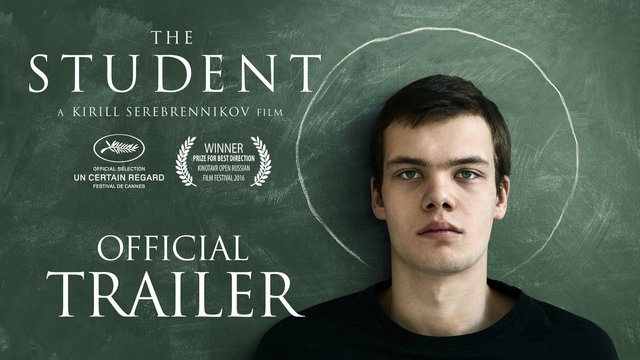/ The Student / Kirill Serebrennikov / film review

The main hero is a schoolboy we meet in a quarrel with a mother. It seems fairly normal for a teenager, until it turns out that he is anxious about swimming. He says, for religious reasons, bathing suits are widespread blasphemy and immorality. The professors are ready to comply with his eccentric demands, only to be left alone.
Although the Prophet has no followers, it's a logical ambition to influence directly the headmaster of the school, who is the image and opportunity of Putinism, the ideology of a congregation that connects Stalinism and Turbo Orthodoxy. We also know this collaboration in other transition countries. It is always imposed as a moderate option that balances two extremes, giving both the same equality. As a rule, one of these options is obscene and crazy, advocates religious fundamentalism, extreme nationalism, anti-Semitism, and the other is "extremely normal," it calls for science, evolution, modernity and human rights.

The original drama of Marius von Mayenburga about a guy who for some reason becomes a religious fanatic, is read in the Western context quite differently than in Russian, from which comes the film adaptation of Kirill Serebrennikov . In the West, redistribution and return to religious matrices can be a kind of rebellion of youth against atheism, agnosticism or the materialism of their liberal parents. However, in the context of contemporary Russia, as well as the post-communist European East, religious dogma is just another form of totalitarianism.
Our title hero is a boy at the end of the elementary school named Venjamin (Skvortsov) and we meet him in a quarrel with his mother (Aug). Sway seems pretty normal for the dynamics between a teenager and his mother, until it turns out that the boy is disturbed by the hours of fisculture, first of all swimming. He says, for religious reasons, bathing suits of widespread blasphemy and immorality. It's not clear to the mother, she stands firmly on the ground, doing three jobs to feed him and raise him in a realistic, socialist and atheistic spirit.
At first, we are as confused as she is. Did the boy really found God? Is the Bible just a hobby and a polygon for manipulation? Was is all this caused by personal problems, by the intervention of a certain person, such as a priest-teacher (Roščin) or a general climate in society? What we see is that professors are, in principle, willing to comply with his eccentric demands, though, only to be left alone. Well, all but one- modern professor of biology Elena (Isakova).

However, for each concession, Venjamin goes one step further. On every resistance, too. In his religion he is extremely tough. He also gets the first follower, Grigory (Gorchilin), who is a disabled person, and he serves as a sack to hit the rest of the class. Grigory's motives are certainly desperate, the desire to accept leads to a religious fascination mixed with homosexual tendencies, and Venjamin manipulates him.
The question arises, why the rest of the class "doesn't put him in order" when the system doesn't. Far from being a loner who embraced asceticism and ceased to be cherished as a prophet, especially with the disabled as an apostle. The stunt is that both sides of their various initiatives have the same enemies, the professor's system, and when a voluptuous boy makes a fuss to professor of biology or someone else, the rest of the class can watch, enjoy and rejoice. Again, is this his main motive?
Before the movie, Serebrennikov placed the drama in the theater, and from that adaptation, he pulls out certain aesthetics: continuous shot from a handful of minutes that simulate and upgrade movement on the stage and the dominance of the verbal ping-pong over the physical component, but the film is nonetheless , or, therefore, extremely fluid and kinetic.

Three years ago, Russian president Vladimir Putin passed a bill enforcing mandatory religious education in all state schools — permitting students and their parents a choice between six religious disciplines, the dominant ideology of Orthodox Christianity chief among them. It was a motion that stood somewhat in conflict with the official separation of church and state, placing clear emphasis on how far modern Russia has drifted from the enforced atheism of Communist rule. As portrayed in “The Student,” schools still appear to be in a transitional phase on this front — perhaps significantly, the action takes place in Kaliningrad Oblast, a Russian exclave that itself seems caught between different geographical and political identities. (1)
Of course, the gray landscapes and educated socialist-brutalistic architecture are inflaming us with awe, but the text itself has opened the possibility for Kaliningrad to become a symbol of the conflict of modernity and retraditionalization.
Production companies: A Wide presentation of a Hype Film production
Cast: Petr Skvortsov, Aleksandr Gorchilin, Aleksandra Revenko, Victoria Isakova, Julia Aug, Svetlana Bragarnik, Anton Vasiliev, Irina Rudnitskaya
Director-screenwriter: Kirill Serebrennikov, based on a play by Marius von Mayenburg
Producers: Ilya Stewart, Diana Safarova, Yury Kozyrev
Executive producers: Murad Osmann, Cosimo Fini
Director of photography: Vladislav Opelyants
Production designer: Ekaterina Scheglova
Costume designer: Tatiana Dolmatovskaya
Editor: Yury Karikh
Music: Ilya Demutsky
Venue: Cannes Film Festival (Un Certain Regard)Not rated, 118 minutes
This was my translation from Croatian to English from Lupiga article ''(M)UČENIK: Film o kojem ćemo još puno slušati'' by M.Stoiljkovic